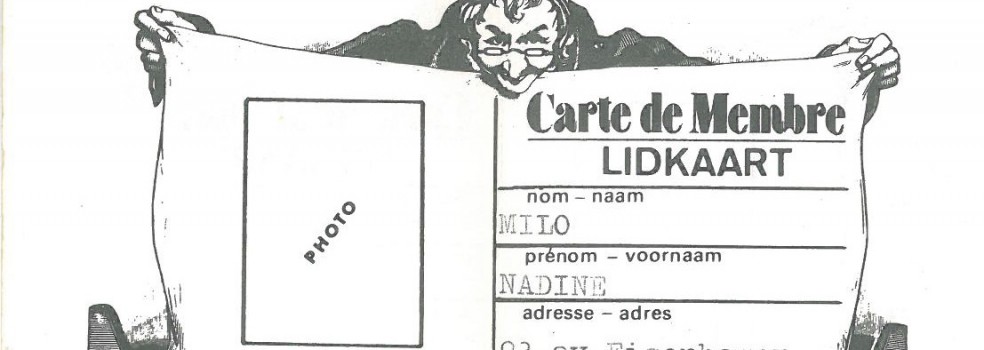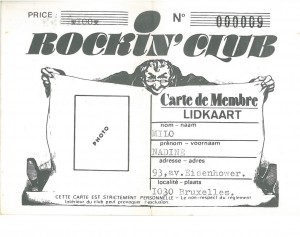In the first half of 1976, the then new rock music magazine More! put Patti Smith on the cover of its March issue and dedicated a page and a half in the June issue to her legendary concert in May at the Paul-Emile Janson Auditorium at the Université Libre de Bruxelles, but it was established musicians like the Stones, Bowie, and Genesis who appeared in full-page articles. In November, “the dinosaur of rock” (see the editorial), Led Zeppelin, was on the cover, while the magazine’s most well-known personality, Bert Bertrand, introduced The Punk Page.
While London was going through cultural boom times, a new generation in Belgium had grown sick of prog rock nerdism (Yes, Emerson Lake & Palmer, Genesis) and took to the stages in small clubs throughout the country. In Brussels, while everyone anticipated the opening in early ‘77 of Rockin’ Club, as announced by More!, the first punks gathered at the Gémeaux, a club on Boulevard du Souverain that, after turning into the Canotier, would later welcome numerous artists, such as Simple Minds, who according to the concert co-organizer, Gilles Verlant, played in front of just twelve people! At that time, tracks from The Ramones –among others– were what got everybody dancing, thanks to DJ Auguste (Gust De Coster, the future co-founder of the independent radio station FM Bruxel in 1980).
The Rockin’ Club opened in February in the Forest National arena. The first Belgian punk group scheduled to play was Hubble Bubble, whose drummer Roger Jouret would go on to be better known as Plastic Bertrand. The second act was Chainsaw, a short-lived group from Brussels, but whose members went on to leave their mark on new wave (Jerry Wanker became WX with Digital Dance), politically engaged punk (Bob Seytor with Streets then Contingent), First category presented in the Belgium Underground App, Punk Music arrives in Belgium in 1976.
and electro (Micky Mike became known as Snowy Red). Finally in April, it was The Kids’ turn to get Rockin’ Club jumping. This trio from Antwerp was founded in 1976 by Ludo Mariman. The Kids and Chainsaw both made claims of being the first punk group to come out of Belgium.
Unfortunately, the wild days of the Rockin’ Club were already coming to an end: the steps on the stairways leading to the ice skating rink and to the club were broken. Clearly, the management at the Forest National arena blamed the punks and not the ice skaters.
In May of 1977, The Damned and The Ramones played at the Janson Auditorium. The Sex Pistols had been scheduled for June 26th, but they never showed up. The Clash, who had been booked to play at the Rockin’ Club, did not come, but instead delivered a raucous performance at the Bilzen Festival in August. A large part of the public and the security guards didn’t understand why the punks—supported by Joe Strummer—wanted to break down the metal gates that formed the press area at the foot of the stage, reserved for the photographers and journalists. On September 16th, Iggy Pop played an unforgettable concert at the Roma d’Anvers where The Kids were the opening band.
In the fall of ’77 however came an outcry from the establishment, which started with the well-known 90db decree. The law was followed by several articles in the general press that aimed to demonize punk rock musicians—or ones thought to be so—as well as their fans while the professors at the Université Libre de Bruxelles complained about the condition of the Janson Auditorium the mornings after concerts.
On January 17th, 1978, the Talking Heads gave a memorable concert in a new venue that would go on to become legendary: the Vieux Saint Job in Uccle. The shows were organized by Clean-X. Gilles Verlant, a personality as influential as Bert Bertrand in the More!/En Attendant staff, teamed up with Phillippe Kopp and Christian Fletcher to organize the shows.
The First Belgian Punk Contest at the Vieux Saint Job in March provided the conditions for different groups to appear on a live album put out by the record label JW, which organized the event. The Mad Virgins played there before participating in a series of discussions on rock music with Verlant that was organized by Diffusion Alternative. The goal was “to raise awareness about a form of music that causes fear.”
In May, 35 Belgian punk and new wave groups played at the Super Nouba concert venue at the Bourse metro station. One particularly notable band was Thrills. It was one of their final concerts before their breakup, even though the singer Xavier Ess, the guitarist Stephan Maes/Barbery, and the drummer Alain Lefebvre (who currently works as a producer) went on to other artistic pursuits.
Patti Smith continued to win over Belgian listeners. She played at the Cirque Royal with The Kids in March and at Forest National with Magazine in September. Among the Belgian groups, X-Pulsion (with the remarkable performer Peter Schläger, guitarist Jerry Wanker/WX, bassist Kurt Klang, and Klaus Klang on drums) would soon give birth to Digital Dance (Jerry and Stéphane Maes/Barbery) and Klang (the famous Klang brothers). Those groups however are already quite a departure from the raw, three-chord punk sound.
Nadine Milo (formerly of More!/En Attendant)

